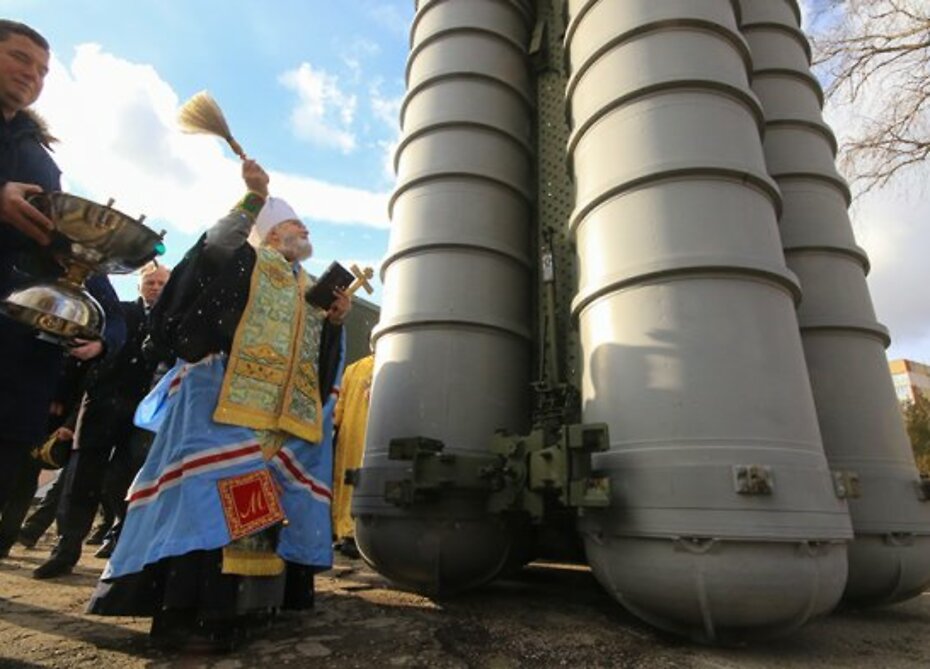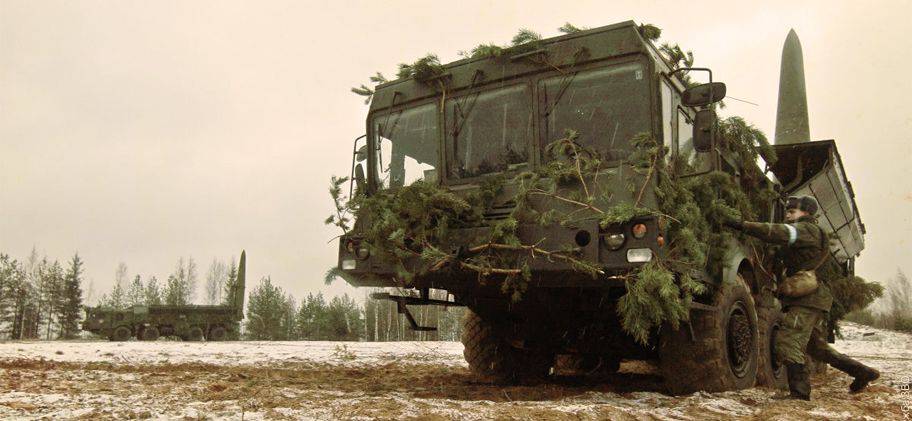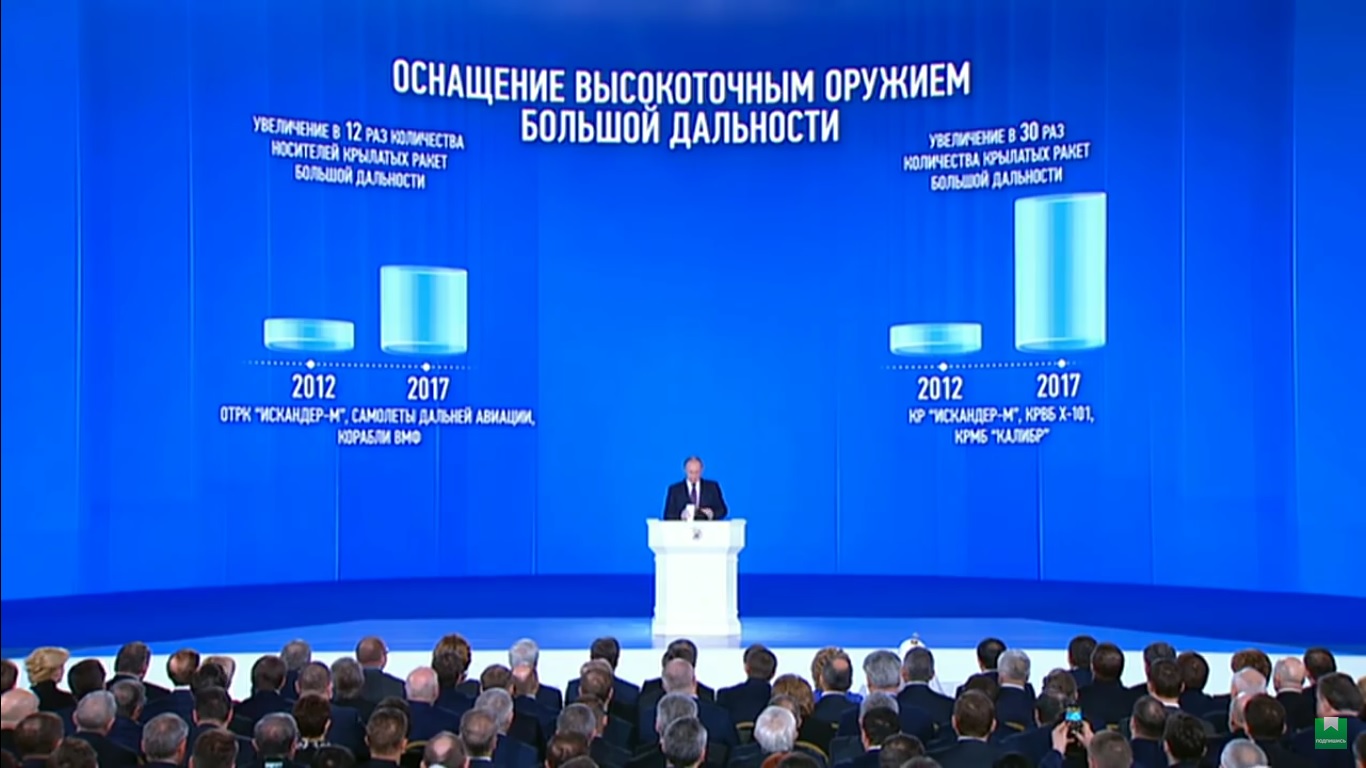Hybrid war, or "the parallel and synchronized use of both military and non-military means to undermine and destabilize countries and alliances,” involves all of the tools the aggressor state possesses. It does not differ between conventional or nuclear arms; or between military and non-military means.
It is a total war, where the aggressor is using its total resources to shape the operational environment.
Nuclear arms constitute a crucial part of its hybrid war against Ukraine, Europe, and the US.
Like the Hybrid War, a “nuclear war” does not necessarily start with a nuclear detonation over the potential target. It follows the same five phases as the hybrid war:
- Shaping
- Active
- Crisis
- Resolution
- Restoration of peace.
Now, it has probably reached the active phase as we are experiencing missile and artillery attacks on nuclear power plants.
Russia has for nearly nine years done its uttermost to ensure that the US and NATO remain disengaged. This objective is even more crucial today. While it has been unable to stop the unprecedented defense support (having succeeded in stopping it in the first 8 years), Russia has succeeded in keeping military intervention off the table. While modern, western weapons have a massive impact on the battlefield, a NATO intervention would fundamentally change the military balance in favor of Ukraine.
It is a testimony of the validity of the hybrid war strategy, where the main battlespace occurs inside the cognitive spaces of populations and key decision- and policymakers. Russia aims to confuse and manipulate. Using disinformation, cyber-attacks, blackmail, provocations, fabrications, military deceptions, and other active measures, it creates a virtual reality that prompts not only its victims but also their partners into making the political decisions Russia wants without suspecting (or acknowledging) they are being manipulated.
As its conventional forces are gradually being defeated, its nuclear arsenal is becoming increasingly more important to its ability to influence key decisions and policymakers in the West.
What if Russia nukes Ukraine? Military strategist Lawrence Freedman explains
Despite Putin’s extremely anti-Western rhetoric, he has not shown any interest in a direct military confrontation.
Militarily, it never has made any sense to seek a confrontation with NATO. The Alliance has a population nearly 7 times bigger than Russia. Its collective defense budget is 22 times bigger. The industrial base of the USA and the EU are many times larger than that of Russia.
It makes even less sense today as its conventional forces are being destroyed in Ukraine. Western weapons, sensors, and intelligence have proven themselves superior on the battlefield. The military professionality of both NATO and Ukraine is by far higher than what the Russian Armed Forces have demonstrated fighting in Ukraine.
As I have repeatedly stressed, if Russia runs the risk of being defeated by Ukraine, it will lose big time against 31 countries.
Russia’s desire to avoid a war with the Alliance has not changed. Its strategy was developed when it considered itself a global power with the world’s second-most powerful military. The decimation of its conventional forces has probably not increased its desire for a military confrontation. Quite the opposite.
The West failed to deter a low-intensity war from turning into a full-scale war. It must now avoid threats turning into a nuclear war or nuclear disaster.
Russia has been shaping the battlefield of the minds as well as the legal framework for years. We have already heard numerous diplomatic statements, and been subjected to multiple cases of ultimatums, threats, attempts of nuclear blackmail, and demonstration of nuclear capabilities.
The risk of nuclear disaster in Russia's war against Ukraine
We have been facing an increased risk of a nuclear disaster since 24 February. Russia is conducting conventional war around Ukraine’s 15 Nuclear Power Plants (NPP) with all the risks this entails. Missile overflights and near impacts have been recorded. Six NPP are regularly exposed to artillery and MLRS attacks. The recent attacks are just the last in a long series of “close calls,” leaving us to hang on the brink of a nuclear disaster. Two days of shelling have caused widespread damage to the Zaporizhzhia Nuclear Power Plant.
Repeated shelling of the plant in southern Ukraine has raised concern about the potential for a grave accident just 500 km from the site of the world's worst nuclear accident, the 1986 Chornobyl disaster.
Generating nuclear power in the heart of a conventional war “is unprecedented,” International Atomic Energy Agency (IAEA) director Manuel Grossi told CNN. “These are completely uncharted waters.”
What’s the worst that can happen at Zaporizhzhia nuclear power plant? Four scenarios
Its occupation and control of the Zaporizhzhia NPP have long been deemed outright unsafe and in breach of its international commitments. The IAEA’s work emphasizes seven “indispensable” pillars of nuclear safety. These are:
- the physical integrity of nuclear facilities
- the functionality of safety equipment
- the ability of staff to act “free of undue pressure”
- an off-site power supply
- uninterrupted supply and transport chains
- effective and widespread radiation monitoring with readiness in case of emergency
- reliable communications.
This year, the violation of these pillars by Russian forces at Zaporizhzhia has dominated the concerns of the IAEA. Frequent shelling and loss of power, the stationing of military equipment on its premises, and the intimidation of the staff increase the risk of a nuclear accident with potentially disastrous results. Russian troops have broken nearly every safeguarding principle, from fire safety protocols to the very basics of not shelling nuclear reactors.
The risk of nuclear proliferation
Irrespective of the West’s inclination to seek de-escalation and avoid a confrontation – the Heads of State cannot turn a blind eye to the new “alliances” or mutual dependencies being established between Russia, Iran, and North Korea as a consequence of its military defeats and western sanctions.
Russia’s dependence on weapon and ammunition supplies from Iran and North Korea is, therefore, highly worrisome. According to CNN citing US intelligence officials, Iran is seeking Russia’s help to bolster its nuclear program should a lasting nuclear deal with world powers fail to materialize. According to unnamed intelligence officials, Iran has been asking Russia for help acquiring additional nuclear materials and with nuclear fuel fabrication.
Iran and North Korea have been trying to build a nuclear arsenal for years. The last 9 years of Russian aggressions have demonstrated the relevance of their ambitions. The threat of nuclear retaliation has deterred NATO and forced it to step away from its past commitment to intervene in conflicts that might threaten the security and stability of its member states.
The risk of nuclear proliferation to Iran and North Korea, therefore, adds concern to already existing nuclear threats and risks.
The West needs to act against Russia's nuclear blackmail
The international community is, therefore, not only facing a hybrid war, nuclear blackmail, the risk of Russian use of tactical nuclear weapons on the battlefield, and the very real risk of a nuclear disaster due to warfighting around nuclear power plants, but also an increased risk of nuclear proliferation.
While I have repeatedly argued why I don’t buy into the Russian nuclear blackmail, the fallout of an unintended nuclear accident is equally damaging for our collective health and security as a nuclear war.
Presently, there is little to stop Russia from using nuclear weapons in Ukraine or triggering a nuclear disaster except for common sense and the risk of triggering the wider war it is trying to avoid. While there are several objective arguments against the use of nuclear arms or a nuclear disaster being initiated, logic and reason do not serve as guarantees. If they did, Russia would not have invaded Ukraine in the first place.
In my opinion, the only guarantee against the use of nuclear arms or a nuclear disaster is to guarantee a broader military confrontation if it happens.
We must not leave any room for uncertainty or interpretations. In the words of the senior director of the Rafik Hariri Center and Middle East Programs at the Atlantic Council William F. Wechsler, the United States can no longer rely on strategic ambiguity:
“When a state possesses substantially more power than its adversaries, a policy of strategic ambiguity can spark reluctance among those adversaries to take actions that might provoke retaliation—especially if the more powerful nation has a reputation for responding unpredictably or disproportionately. But when a state’s relative power is perceived to be in decline, then a policy of strategic ambiguity can, conversely, inspire adventurism in an adversary—especially if the declining power is seen to be withdrawing, or otherwise appears weak or distracted.”
I have previously argued that Russia sees the collective West as weak after 15 years of inaction and lack of response to its gross violations of international law, for its unwillingness to support Ukraine in a meaningful manner during the first 8 years of the war, for its lack of will and ability to defend international law and shared values, for the member states lack of will to meet their NATO commitments, and for their failure to rebuild the armed forces when the war started in 2014.
More words of concern and threats of potential consequences will not be enough simply because it will be seen as a continuation of a policy that led to a full-scale war -- speaking softly while not carrying a big stick.
If the USA and Europe genuinely want to guarantee that a nuclear catastrophe does not happen – irrespectively whether another “Chernobyl” or the potential use of nuclear weapons – they must ensure that Russia knows beyond any shred of doubt that this will trigger the war it desperately wants to avoid.
This can be achieved through the following measures by NATO:
- Publicly acknowledge the true scope and scale of the war: The Russian aggressions are a part of a broader confrontation with the West, in which the defeat of Ukraine is only one out of several crucial objectives. The recognition would signal a shift in NATO's policy, triggering the countermeasures needed to deter further transgressions. It would help rebuild deterrence and credibility.
- Forward deploy military forces to Ukraine to establish a tripwire: Any conventional or nuclear attacks against Ukrainian territory run the risk of NATO casualties, triggering a military response and an escalation.
- Establish 3-dimensional safety zones around the 15 Ukrainian NPPs, evicting Russian forces based at ZNPP.
- Fast track a Ukrainian NATO membership to ensure that its collective defense guarantee extends to Ukraine, again triggering an Allied response in case of continued warfighting. The starting point would be to offer Ukraine the same security guarantees several NATO members have extended to Finland and Sweden.
Admittingly, it is presently hard to see NATO member states finding the moral courage to agree on these measures. But then again, if they don’t, they must accept the ever-increasing risk of a nuclear disaster in Europe, irrespectively of its cause or origin.
For all of those who don’t find it important to do the right thing, stop the meaningless suffering and destruction, fulfil past commitments, defend international law and democracy, and stop the “tsunami of ripple effects” from changing the political landscape in Europe:
An intervention is the only way to counter the Russian nuclear “fait accompli” strategy and, consequently, effectively curb its aggressive foreign policy.
Related:
- What’s the worst that can happen at Zaporizhzhia nuclear power plant? Four scenarios
- Russia denies IAEA full access to Zaporizhzhia nuclear plant after it was rocked by powerful explosions this weekend
- From “nuclear backpacks” to “orgy” plans – Ukrainians brace for a nuclear strike
- What if Russia nukes Ukraine? Military strategist Lawrence Freedman explains





